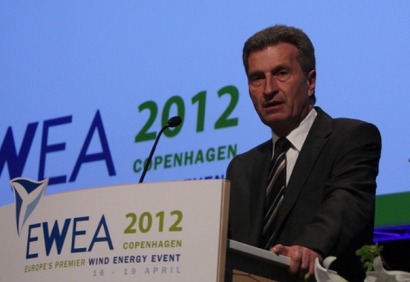
During the opening session of EWEA 2012 today in Copenhagen (Denmark), HRH Crown Prince Frederik of Denmark said "focusing on the role of wind power for our sustainable future makes good sense from both an environmental and an economic perspective".
Danish Prime Minister, Helle Thorning-Schmidt, meanwhile commented that clean energy “is both about job creation in the short run and climate protection in the long run".
EWEA was keen to highlight the success of the wind energy industry in recent years, after it increased its contribution to the EU's gross domestic product (GDP) by 33% between 2007 and 2010. In 2010, the industry's growth was twice that of the EU's GDP overall, with the sector contributing €32 billion to an EU economy in slowdown.
Key figures from the Green Growth report released by EWEA today also show that the sector created 30% more jobs from 2007 to 2010 to reach nearly 240,000, while EU unemployment rose by 9.6%. EWEA estaimates that there should be 520,000 jobs in the sector by 2020.
"Wind energy is a recession-busting industry. It is countering the recession - providing increasing economic activity, more jobs and exports every year to an EU struggling with an economic crisis intensified by ever increasing amounts of fuel being imported at rising costs to European citizens," said Arthouros Zervos, President of EWEA.
The sector was also a net exporter of €5.7 billion worth of goods and services in 2010 and avoided €5.71 billion of fuel costs in 2010.
Meanwhile, the sector invested 5% of its spending in R&D – three times more than the EU average – with wind turbine manufacturers committing around 10% of their total turnover to R&D.
In future, the wind energy sector is set to do even more: by 2020 its contribution to GDP will have increased almost three-fold. If the industry were a Member State, it would rank 19th in 2020 in terms of its contribution to EU GDP, above Slovakia and just below Hungary, and the number of jobs will go up by over 200% to reach 520,000 by then, says the report. By 2030, the number of jobs could go up to 795,000.
However, to ensure wind energy brings the increased economic benefits it should in future, EWEA has issued a wish list of things that need to be done now to secure the industry’s future:
- Stable national renewable energy frameworks, and ambitious implementation of 2020 requirements at national level
- A post-2020 energy policy with a binding renewables target for 2030
- A joined up European power grid and single energy market
- A more ambitious 30% greenhouse gas reduction target for 2020
- Sufficient and dedicated EU funding for wind energy research
"EWEA's new report shows that wind energy has become a significant factor for jobs and growth in Europe", commentsFelix Ferlemann, CEO of Siemens Wind Power.
For additional information:

